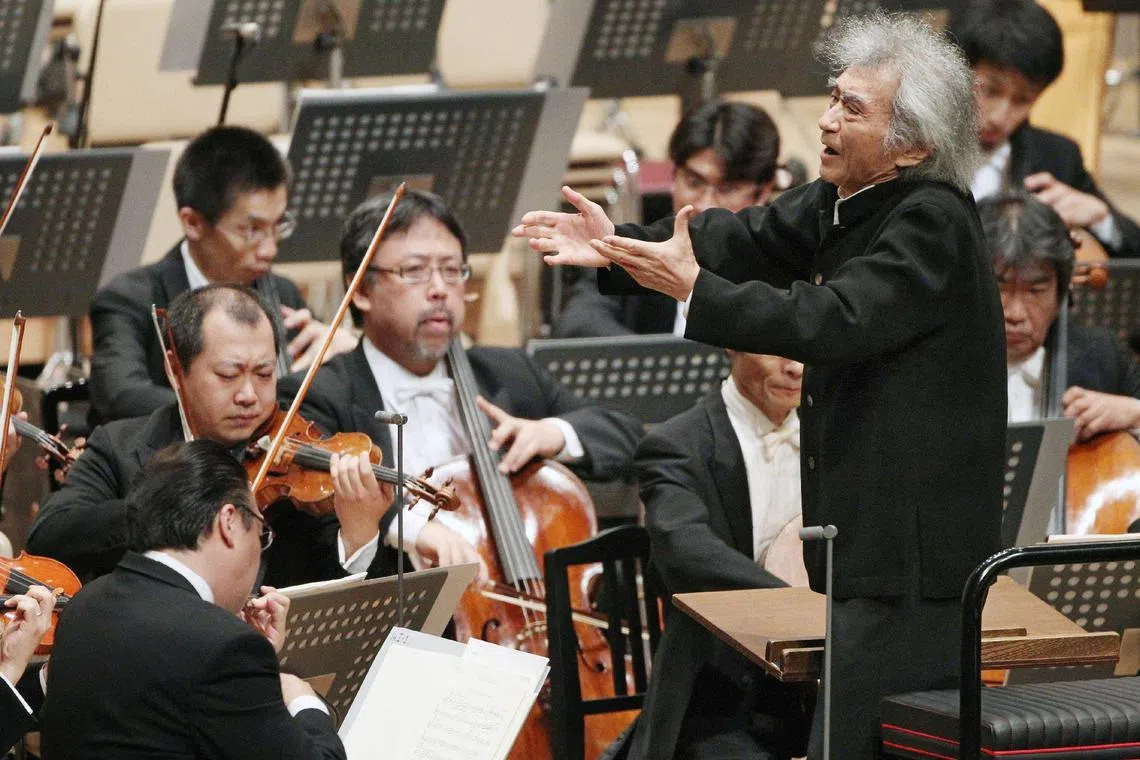Magic touch: Japan’s star conductor Seiji Ozawa dies at 88
Sign up now: Get insights on Asia's fast-moving developments

Seiji Ozawa was named Japan's most exceptional talent in 1958. Then, he moved abroad, and changed the world.
PHOTO: AFP
TOKYO – Two broken fingers in a rugby match changed everything for Seiji Ozawa, the celebrated Japanese conductor who blazed a trail in classical music, connecting Eastern traditions with the West.
Public broadcaster NHK and other Japanese media reported on Feb 9 that he died of heart failure on Feb 6 at his home in Tokyo. He was 88 years old.
As a teen, the maestro seemed destined for a career as a pianist. But he also had another passion – rugby – which his piano teacher mother banned him from playing.
Naturally, he defied her, and one day he broke his two index fingers during a game, ending all hope of ever becoming a concert pianist.
It was only then the idea of conducting was floated.
Years later, then United States President Barack Obama would gently chide the diminutive conductor for his costly act of rebellion. “Now I have to say, looking at you Seiji, I’m not sure that was a good idea” taking part in that rugby match, Mr Obama said. “But fortunately, for the rest of us, it opened up the door to a career as a conductor.”
Lawnmower
Broken fingers were not the only obstacle Ozawa had to a musical career.
He would later sum up his childhood as: “No money, my house.”
Born in northern China, which was then occupied by Imperial Japan, Ozawa’s family fled back to Tokyo as defeat in World War II loomed in 1944.
Although his father was a dentist, there was little cash to spare, and Ozawa paid for his lessons by mowing his teacher’s lawn.
After the life-changing accident in 1950, it was his piano teacher who suggested the 15-year-old try conducting, an unknown world for Ozawa at the time.
But after seeing his first orchestral concert – Beethoven’s Piano Concerto No. 5, he later recalled with typical precision – he was hooked.
“I’m the complete opposite of a genius, I have always had to make an effort,” he told a 2014 news conference.
“I don’t really like studying, but I had to do it if I wanted to make music. Anybody with genius can easily do better than me.”
Bernstein and Von Karajan
In 1958, he was named Japan’s most exceptional talent. He went abroad the following year, a move that proved a game changer.
He met some of the greatest luminaries of the classical music world, including composer and conductor Leonard Bernstein
In 1963, the great conductor Herbert von Karajan took him on as assistant at the Berlin Philharmonic.
Ozawa went on to lead orchestras in Chicago, Toronto and San Francisco, and had a 29-year stint as musical director of the Boston Symphony Orchestra, where it named a concert hall after him.
“That was a really important time in my life,” he was quoted as saying. “No matter where I go, Boston is a part of my heart.”
He left in 2002 to become chief conductor at the Vienna State Opera until 2010.
That stint was overshadowed by ill health, including a diagnosis of oesophageal cancer in 2010, the year he left.
He later had surgery for a back injury and suffered bouts of pneumonia, which often kept him sidelined but failed to dent his enthusiasm. “I will continue doing everything I have always done, teaching and conducting orchestra, until I die,” Ozawa told Reuters in a December 2013 interview.
The downtime had advantages by freeing him to study music, talk with friends, including best-selling Japanese author Haruki Murakam
“I had always been looking ahead, since if you don’t forget the piece you conducted at one day’s concert, you can’t prepare for the next,” he wrote in a 2014 essay for the Nikkei newspaper.
“I had never reflected on the past. There had simply never been enough time.”
Although he enjoyed his glittering career in the West, Ozawa never lost sight of his roots, founding an orchestra and the Seiji Ozawa Festival that is now one of Japan’s top classical music events.
Baseball nut
Sport may have dashed his early hopes of becoming a pianist, but Ozawa never fell out of love with it, particularly baseball, Japan’s most popular sport.
He was the proud owner of a gold lifetime pass to US Major League Baseball.
Recalling his days in Boston, he said he had been particularly fond of ending a performance night by catching the end of a Red Sox game.
At the “end of a concert, I look at the television – and usually, baseball is longer than (the) concert so I ask Peppino, our driver, ‘Okay, Peppino, let’s go!’ And then I go” to the baseball stadium, he said.
Ozawa is survived by two brothers, Mikio and Toshio Ozawa; his wife, Vera; their son, Yukiyoshi, an actor; their daughter, Seira, a writer; and a grandson. AFP, REUTERS, NYTIMES


